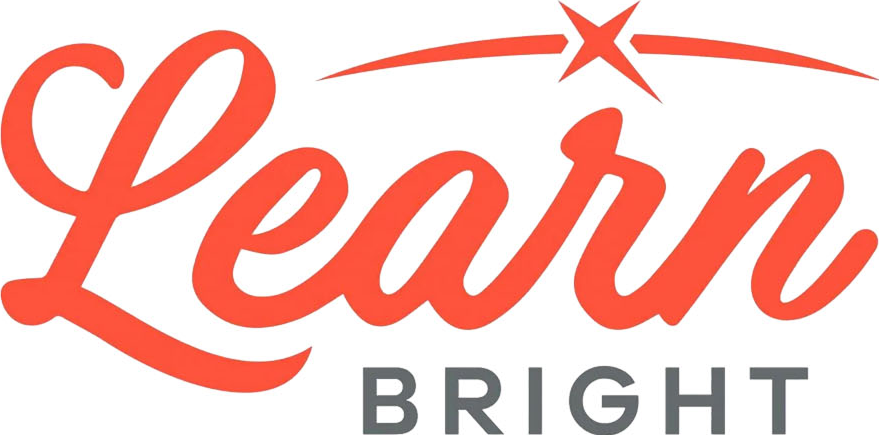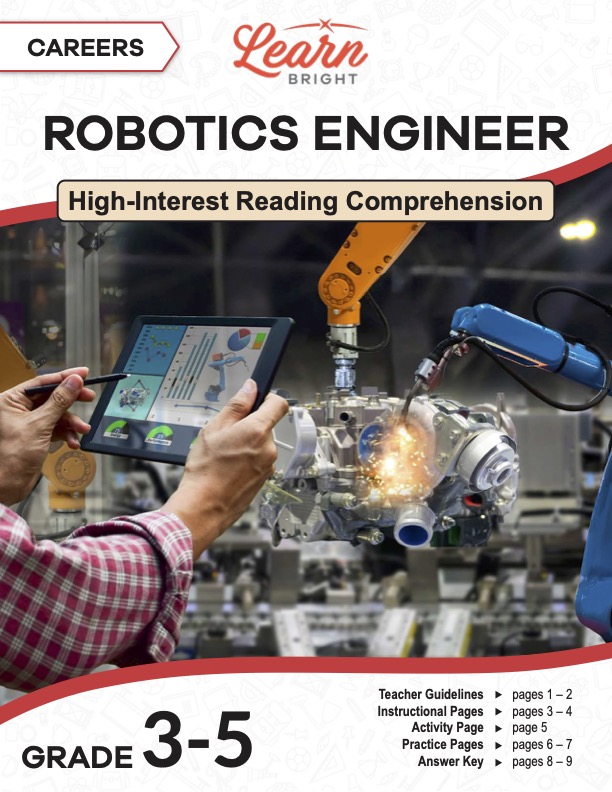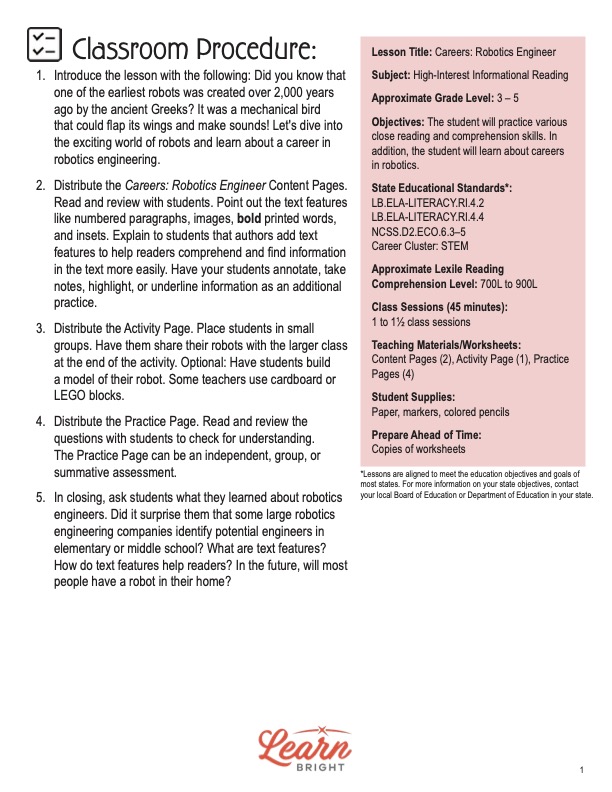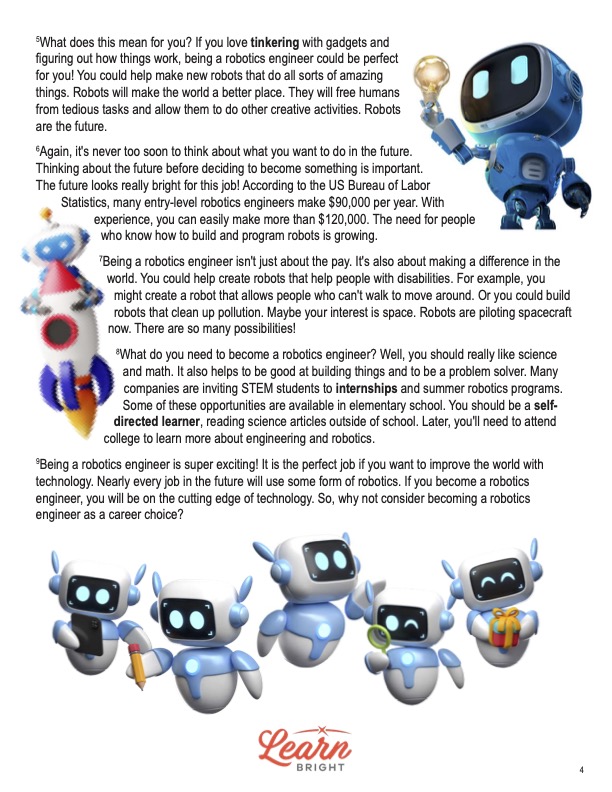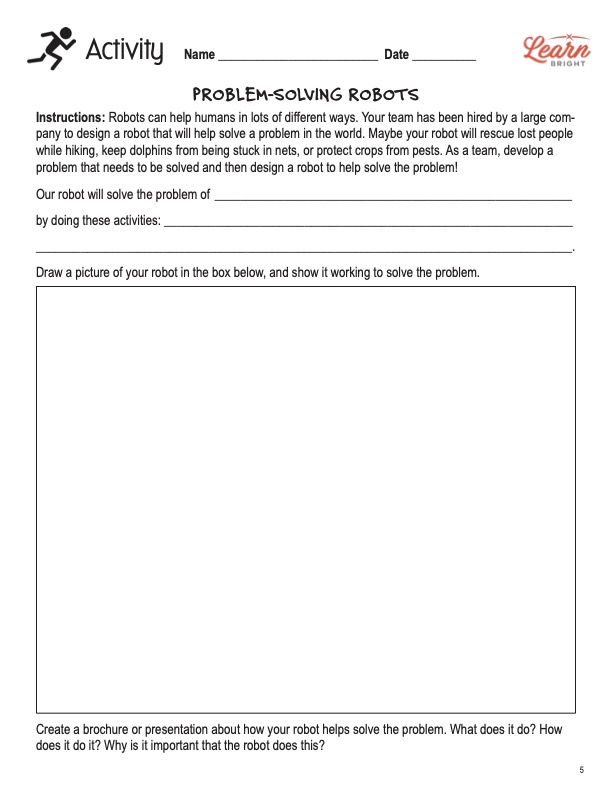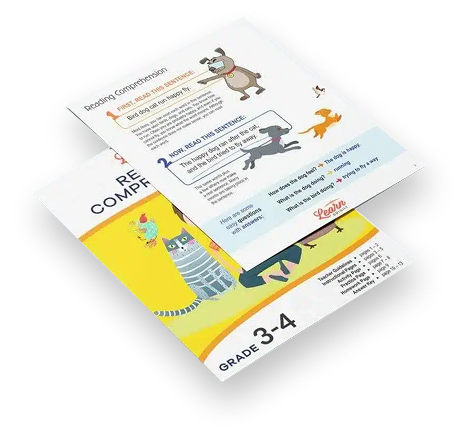Description
What our Careers: Robotics Engineer lesson plan includes
Lesson Objectives and Overview: Careers: Robotics Engineer is a high-interest reading comprehension lesson plan. As such, students will practice various close reading and comprehension skills. In addition, they will learn about careers in robotics. This lesson is for students in 3rd grade, 4th grade, and 5th grade.
Classroom Procedure
Every lesson plan provides you with a classroom procedure page that outlines a step-by-step guide to follow. You do not have to follow the guide exactly. The guide helps you organize the lesson and details when to hand out worksheets. It also lists information in the yellow box that you might find useful. You will find the lesson objectives, state standards, and number of class sessions the lesson should take to complete in this area. In addition, it describes the supplies you will need as well as what and how you need to prepare beforehand. Gather paper, markers, and colored pencils for the activity.
Teacher Notes
The paragraph on this page provides a little more information or guidance on what to expect from the lesson. It explains that you can teach this lesson in a whole-class setting or as an independent, small-group activity. You can use the blank lines to record any thoughts or ideas you have as you prepare.
CAREERS: ROBOTICS ENGINEER LESSON PLAN CONTENT PAGES
What Is a Robotics Engineer?
The Careers: Robotics Engineer lesson plan contains two content pages. You might be wondering why anyone would talk to you about becoming a robotics engineer. After all, you’re just a kid! Let me assure you—it’s never too early to start learning about a career in robotics engineering. Many large robotics companies start looking for talent in elementary and middle school. Today is the perfect time to explore the world of robots.
Are you are fascinated by robots? Have you ever built a robot with LEGOs? If so, you might just be the perfect person to become a robotics engineer! Robotics engineers help create robots that can perform human and nonhuman tasks. They design, build, and repair robots. Plus, they research and develop applications for existing robots.
Robots, Robots Everywhere
Robots have become more common. They perform jobs that are too dangerous for humans. For instance, you can find them welding parts in car assembly plants. Simple robots clean houses. In hospitals, robots dispense medicine, and some even perform surgery on humans. They are in mines, under water, and in space. The military, police, and emergency crews use robots all the time. Anywhere a task is repetitive, requires precision, or is dangerous for humans to do, you will find a robot. There are thousands of uses for them.
Imagine a world without robotics engineers. We wouldn’t have robots that help doctors in hospitals or explore distant planets. We wouldn’t benefit from the efficiency of robots. The convenience of robotic vacuum cleaners has made cleaning your house a breeze. And we wouldn’t witness the humanoid robots interacting with humans in theme parks and exhibitions. Nearly everyone may have a robot doing something for them in the future.
What to Expect as a Robotics Engineer
What does this mean for you? If you love tinkering with gadgets and figuring out how things work, being a robotics engineer could be perfect for you! You could help make new robots that do all sorts of amazing things. Robots will make the world a better place. They will free humans from tedious tasks and allow them to do other creative activities. Robots are the future.
Again, it’s never too soon to think about what you want to do in the future. Thinking about the future before deciding to become something is important. The future looks really bright for this job! According to the US Bureau of Labor Statistics, many entry-level robotics engineers make $90,000 per year. With experience, you can easily make more than $120,000. The need for people who know how to build and program robots is growing.
Being a robotics engineer isn’t just about the pay. It’s also about making a difference in the world. You could help create robots that help people with disabilities. For example, you might create a robot that allows people who can’t walk to move around. Or you could build robots that clean up pollution. Maybe your interest is space. Robots are piloting spacecraft now. There are so many possibilities!
Becoming a Robotics Engineer
What do you need to become a robotics engineer? Well, you should really like science and math. It also helps to be good at building things and to be a problem solver. Many companies are inviting STEM students to internships and summer robotics programs. Some of these opportunities are available in elementary school. You should be a self-directed learner, reading science articles outside of school. Later, you’ll need to attend college to learn more about engineering and robotics.
Being a robotics engineer is super exciting! It is the perfect job if you want to improve the world with technology. Nearly every job in the future will use some form of robotics. If you become a robotics engineer, you will be on the cutting edge of technology. So, why not consider becoming a robotics engineer as a career choice?
CAREERS: ROBOTICS ENGINEER LESSON PLAN WORKSHEETS
The Careers: Robotics Engineer lesson plan includes two worksheets: an activity worksheet and a practice worksheet. Each one will help students solidify their grasp of the material they learned throughout the lesson. You can refer to the classroom procedure guidelines to know when to hand out each worksheet.
PROBLEM-SOLVING ROBOT ACTIVITY WORKSHEET
For the activity, students will work with a team to design a robot that will solve some problem in the world. First, students will collaborate with each other to decide which problem they will solve. Then, they will design and draw their robot in the box at the bottom of the page. Finally, they will create a brochure or presentation that explains how their robot helps solve the problem.
CAREERS: ROBOTICS ENGINEER PRACTICE WORKSHEET
The practice worksheet requires students to answer a series of 10 questions. These questions all relate to the content pages, so students will need to refer to them often for the answers. In addition, each question provides which reading tool the question corresponds to, such as text feature, vocabulary, or comprehension.
Worksheet Answer Keys
At the end of the lesson plan document is an answer key for the practice worksheet. The correct answers are all in red to make it easier for you to compare them with students’ responses. If you choose to administer the lesson pages to your students via PDF, you will need to save a new file that omits these pages. Otherwise, you can simply print out the applicable pages and keep these as reference for yourself when grading assignments.
